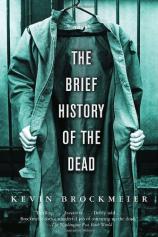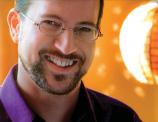Reading Group Guide
Discussion Questions
The Brief History of the Dead

1. The Brief History of the Dead is prefaced with a quote describing African societies that believe humans pass from being alive to living-dead, to dead. How does the author explore this idea throughout the novel?
2. The novel begins with a description of crossings to the city of the dead. What sense do you get of the city from the first chapter? What is the emotion created by opening with varied stories of the crossings, and particularly with the first story of the blind man? What is the significance of beginning and ending with the blind man, and how are he and Laura connected or separate from each other in their relationship to their respective worlds?
3. "The stories people told about the crossing were as varied and elaborate as their ten billion lives, so much more particular than those other stories, the ones they told about their deaths." For many of the characters, telling the stories of their "crossing" is essential to their sense of self in the city of the dead. What are some of the different crossings like, and how does each character tell their story? What does the importance of these stories suggest about a transition from the world of the living to the city? Why are some people, like the blind man, unable to let go of their story?
4. "The city was not heaven, and it was not hell, and it was certainly not the world." How does the city operate and expand or contract? What is the thumping noise and how does it affect the characters? How is the city different from the world of the living, both in physical and emotional ways?
5. When Marion wonders what it means to exist in the city, Phillip replies that "the only thing we can do is stop asking impossible questions and just make the best of it." How do the different characters respond to their new lives in the city? What does it mean that some, like Bristow, take advantage of their situation and play a new role; in his case, switching from tollbooth operator to restaurant owner? Had dying changed Marion in the same way it changed Bristow? Or Phillip? What sort of stereotypes about dying does Brockmeier explore through his characters' rebirths in the city?
6. Much of The Brief History of the Dead is structured around memory and its role in Laura's survival and in the lives of those in the city. Are the memories of the living and the living-dead different? How do they function in the characters' lives, and do they change how each character experiences the world he or she exists in? What do you imagine the author is suggesting about the role of memory and the role of storytelling?
7. In many ways, Luka is the voice of the city of the dead. What does his character suggest about the role of the media in creating a world?
8. "How many people was any one human being likely to remember?" Puckett asks himself. Marion feels that the city is comprised of "hundreds of faces she could not quite place but was sure that she had seen somewhere before. What does the existence of the city of the dead suggest about the depth of everyday interactions? Laura believes that she is "no one special....When she died, there would be no one to remember her." How does the author explores the clichés of remembering the dead? What does Laura's remembered world look like? Does the strength of her memory affect the presence those in the city of the dead?
9. Minna creates her place in the world and in relationships by asking questions. "Which do you like better, the idea of the past or the idea of the future?" and "What do you think is better, this world or the other?" How does Luka respond to her questions? How might Marion respond? Coleman? The blind man?
01. How does The Brief History of the Dead address the idea of guilt? What is the role of Lindell Trimble in the book? What does it mean that, "To his last breath Lindell would continue to deny any responsibility for what happened." Why does the author create the absurd scene of Lindell with his trash can, making his lonely way through the snow?
11. Discuss the role of faith in the book. "But for every person who lost his faith, there was someone who held fast to it, and someone else again who adopted it." What is the meaning of the man who dies holding a red and blue envelope, and picks the wrong one? What does this story, the crossing stories, and the popularity of the Sims Sheet in times of change suggest about the characters deep need to know what will happen and has happened. Is there a difference in characters' need for knowledge? What is the role of Coleman Kinzler and his signs?
12. "At some point...you had to determine whether you were going to be the sort of person who held tight to every single thing that passed through your life, no matter how insignificant, or the sort of person who sets it all adrift." Laura thinks of herself as the kind who won't let go. Luka describes himself as someone who exists on the peripheries, an observer and not a participant. What effects might their different perspectives have on the kind of world their lives would create? How does the book explore ideas about living in the present and participating in life?
13. In many ways, the end of The Brief History of the Dead functions as the opening to new world of stories. What do you think comes after the city of the dead?
The Brief History of the Dead
- Publication Date: January 9, 2007
- Genres: Fiction
- Paperback: 272 pages
- Publisher: Vintage
- ISBN-10: 1400095956
- ISBN-13: 9781400095957








